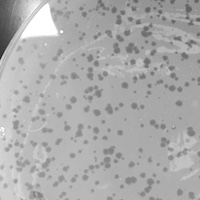Gordonia phage Dudley
Add or modify phage thumbnail images to appear at the top of this page.
Know something about this phage that we don't? Modify its data.
| Detailed Information for Phage Dudley | |
| Discovery Information | |
| Isolation Host | Gordonia terrae 3612 |
| Former names | Lenni |
| Found By | Julie Jones |
| Year Found | 2017 |
| Location Found | Pittsburgh, PA USA |
| Finding Institution | University of Pittsburgh |
| Program | Science Education Alliance-Phage Hunters Advancing Genomics and Evolutionary Science |
| From enriched soil sample? | No |
| Isolation Temperature | -11°C |
| GPS Coordinates | 40.44 N, 79.95 E Map |
| Discovery Notes | The soil sample in which Dudley was discovered was collected on Sunday, January 8, 2017 at approximately 2:00 PM. This soil sample was taken from the William Pitt Union Lawn. Considering this sample was collected during the winter season and the ground was covered in snow, there was no live vegetation near the collection site; however, there were several dead trees and bushes. Approximately one quarter of a plastic bag's worth, or a little more than half a plastic cup's worth, of soil was collected from approximately one inch below the surface of the collection area. The soil was dark brown in color and contained small pieces of decaying grass, but no other noticeable debris. The soil felt cold to the touch from the outside of the plastic bag, as well as soft, which was surprising considering the fact that it was cold. In terms of weather, on Sunday, January 8, the temperature was 12ºF, although it reportedly felt like 1ºF. It was sunny, with minimal clouds in the sky, and also very windy, with winds of approximately 8 mph. The soil sample was transported for approximately five-seven minutes (from the WPU Lawn to Tower A) and was stored in a room-temperature drawer for approximately 24 hours. |
| Naming Notes | This bacteriophage was named Dudley after a stuffed animal that I had when I was a little girl. Additionally, Dudley was chosen because I believe that it is a suitable name for a bacteriophage. |
| Sequencing Information | |
| Sequencing Complete? | No |
| Genome length (bp) | Unknown |
| Character of genome ends | Unknown |
| Fasta file available? | No |
| Characterization | |
| Cluster | Unclustered |
| Subcluster | -- |
| Annotating Institution | Unknown or unassigned |
| Annotation Status | Not sequenced |
| Plaque Notes | After completing the fourth plaque purification, the plaque morphology of Dudley appeared to be consistent. The plaques produced by Dudley are quite small, but of varying sizes, with diameters between 0.1 mm and 1.0 mm. Although it is considered uncommon for a phage to produce multiple plaque morphologies, because Dudley consistently produces plaques of different sizes, it is logical to assume that Dudley may produce more than one type of plaque morphology. Another possible explanation for the varying sizes of the plaques is that certain phage particles may reproduce at faster or slower rates than other phage particles, resulting in plaques of different sizes. Aside from size, the plaques produced by Dudley are relatively circular, and quite clear. The clarity of the plaques suggests that Dudley may reproduce using the lytic life cycle. |
| Has been Phamerated? | No |
| Publication Info | |
| Uploaded to GenBank? | No |
| GenBank Accession | None yet |
| Refseq Number | None yet |
| Archiving Info | |
| Archiving status | Archived |
| Pitt Freezer Box# | 55 |
| Pitt Freezer Box Grid# | F2 |
| Available Files | |
| Plaque Picture | Download |
